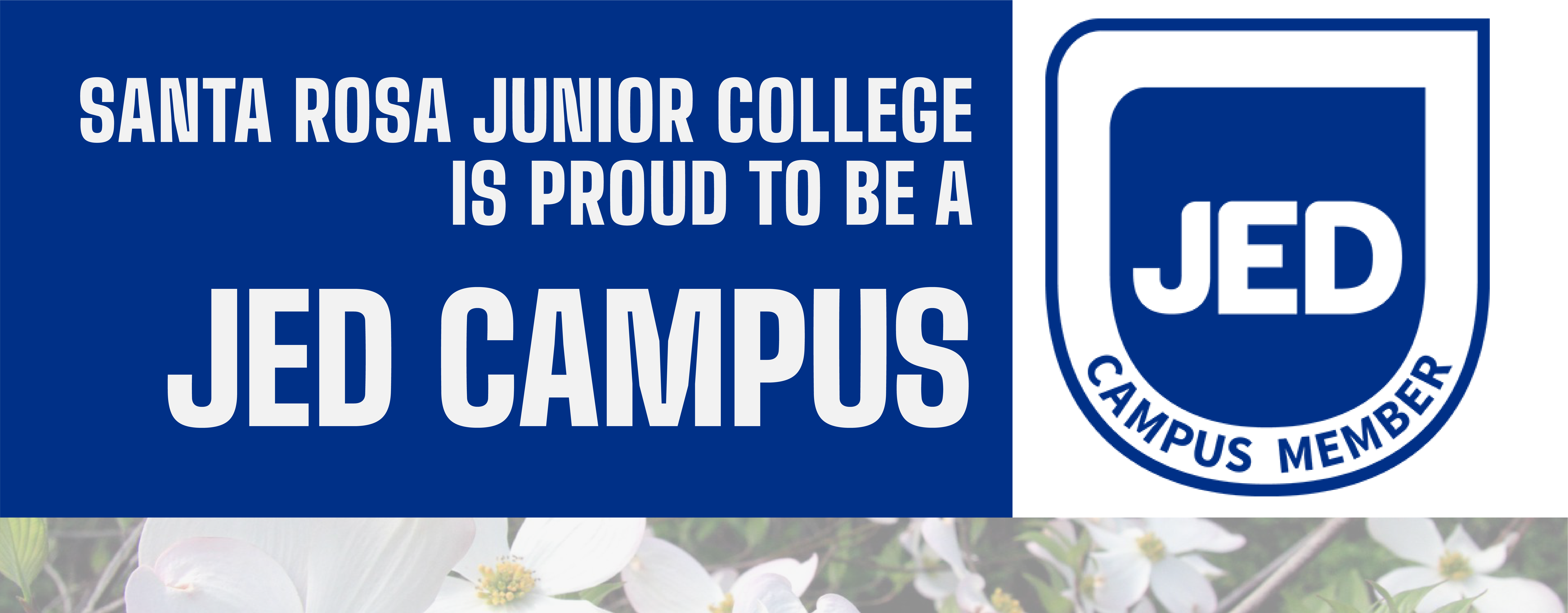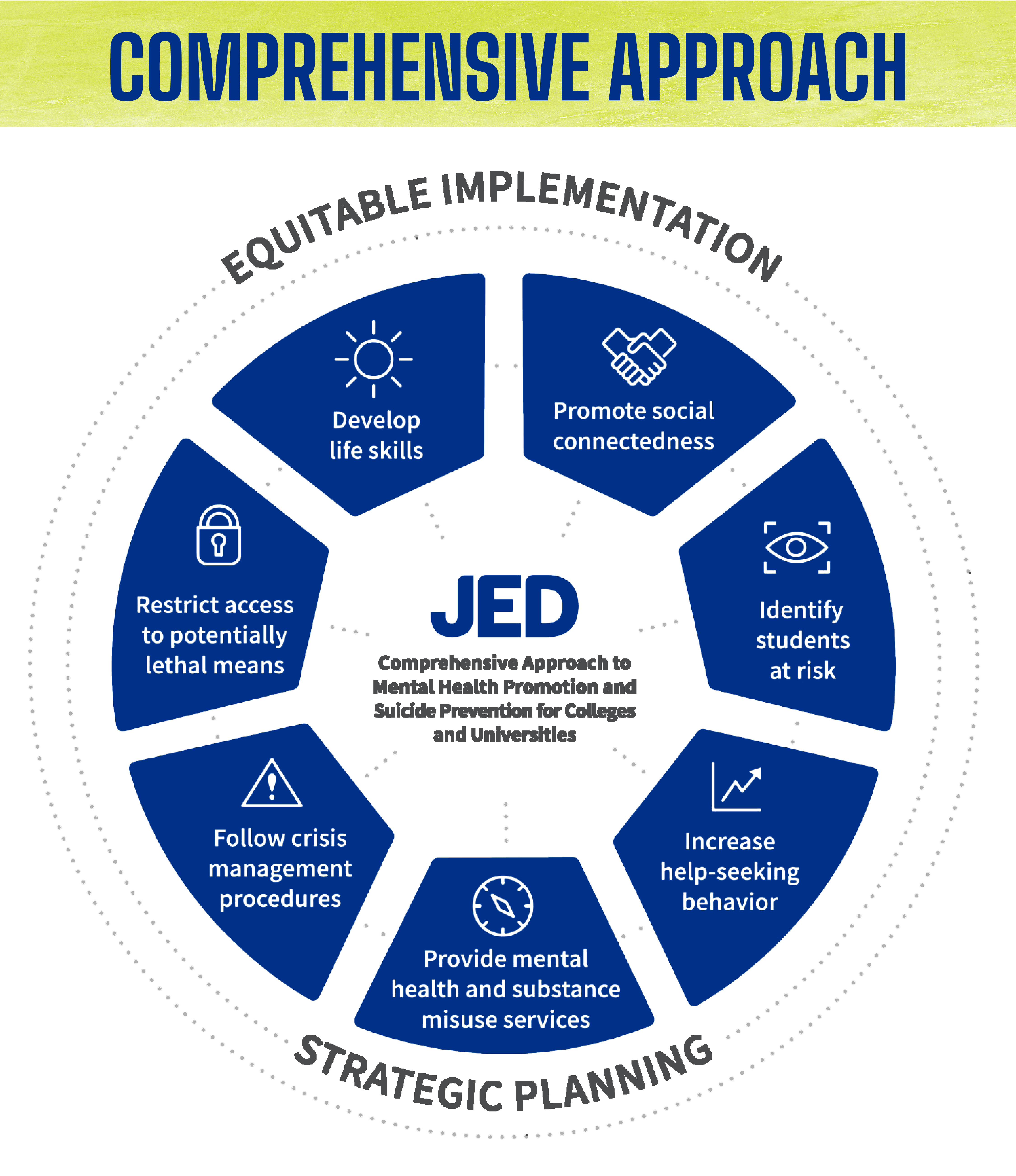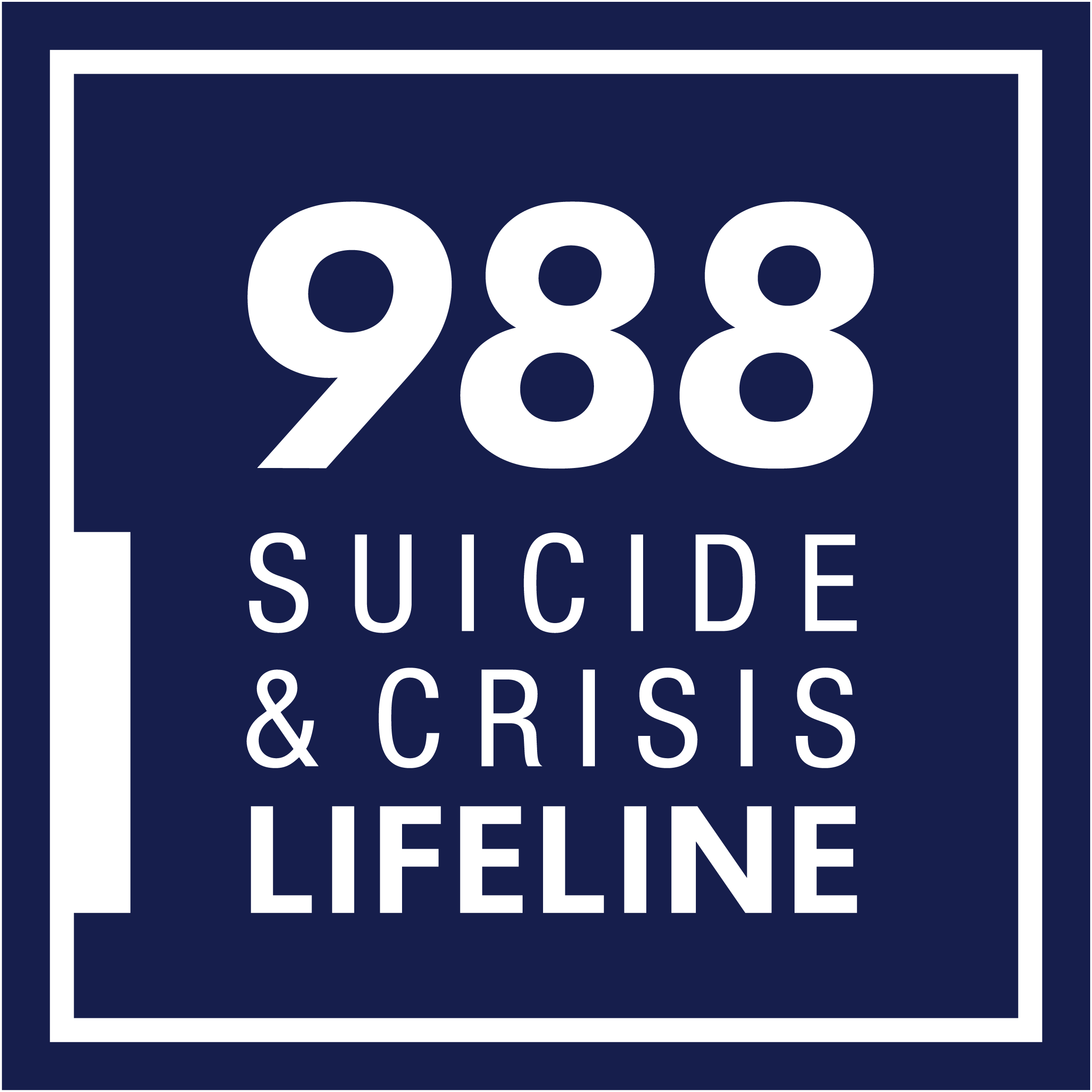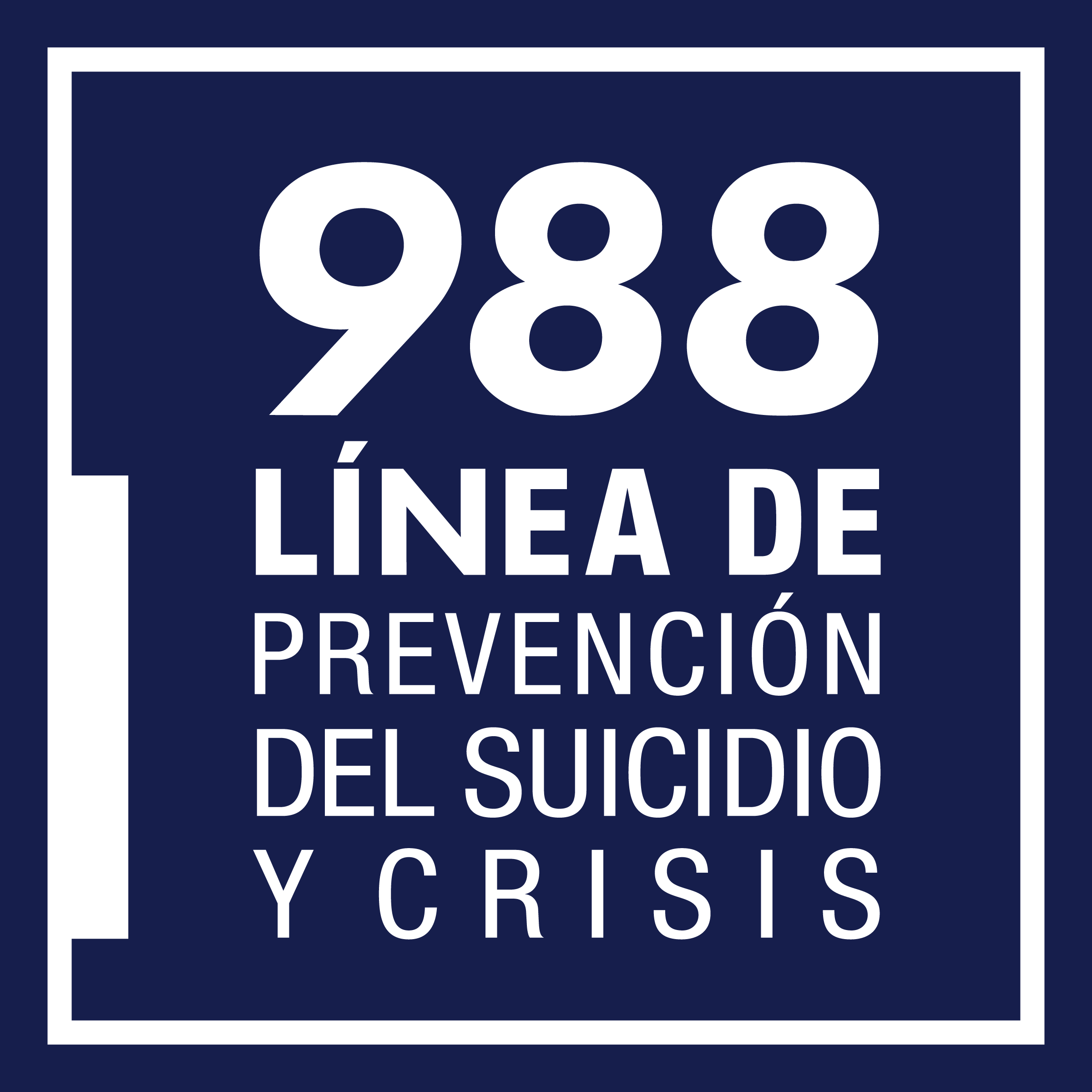
ALL ABOUT JED CAMPUS
- What is JED Campus?
JED Campus is a signature program of The Jed Foundation (JED) designed to guide schools through a collaborative process of comprehensive systems, program and policy development with customized support to build upon existing student mental health, substance use and suicide prevention efforts.
- The Healthy Minds Survey Data
The Healthy Minds Study provides a detailed picture of mental health and related issues in college student populations. Schools use their data for the following purposes: to identify needs and priorities; benchmark against peer institutions; evaluate programs and policies; plan for services and programs; and advocate for resources. READ THE REPORT
- What is the JED Campus Comprehensive Approach?
JED Campus believes in a comprehensive, public health approach to promoting emotional well-being and preventing suicide and serious substance misuse. This model is used to assess efforts currently made on campus, identifying existing strengths and areas for improvement.
JED built upon its comprehensive approach in 2017 by developing the Equity in Mental Health Framework, in partnership with The Steve Fund, which provides ten recommendations and implementation strategies to help colleges and universities better support the mental health of students of color.

 DEVELOP LIFE SKILLS
DEVELOP LIFE SKILLS
Supporting life skills education is valuable in teaching healthy ways to cope with the stress of college life. Some of the life skills that are important to a student's well-being include managing friendships and relationships, problem solving, decision making, identifying and managing emotions, healthy living, and finding life purpose, meaning and identity.
 PROMOTE SOCIAL CONNECTEDNESS
PROMOTE SOCIAL CONNECTEDNESS
Research has shown that loneliness and isolation are significant risk factors for mental health problems and/or suicidal behavior. Therefore, supportive social relationships and feeling connected to campus, family and friends are protective factors that can help lower risk.
 IDENTIFY STUDENTS AT RISK
IDENTIFY STUDENTS AT RISK
It is important to take action to identify students at risk for mental health problems and/or suicidal behavior, and also to promote emotional health awareness among those who interact with students the most — “gatekeepers” such as residence hall staff, academic advisors, faculty and even fellow students — as it is vital for these people to be able to recognize and refer a student who might be in distress.
 INCREASE HELP-SEEKING BEHAVIOR
INCREASE HELP-SEEKING BEHAVIOR
Many students who need help may be reluctant or unsure of how to seek it out. Obstacles to help-seeking include lack of awareness of mental health services, skepticism about the effectiveness of treatment, prejudices associated with mental illness and uncertainty about costs or insurance coverage. Campuses should engage in a variety of activities designed to increase the likelihood that a student in need will seek help.
 PROVIDE MENTAL HEALTH & SUBSTANCE ABUSE SERVICES
PROVIDE MENTAL HEALTH & SUBSTANCE ABUSE SERVICES
It is essential to offer accessible, consistent and high-quality mental health services to students. To make mental health and substance abuse care more comprehensive, it should include strong and flexible services, adequate staffing levels and staff diversity reflective of the student population, flexibility in treatment approaches and clinic hours that are reflective of student schedules. Since most college clinics are free, the length of treatment is often limited. Therefore, it is important that campus mental health services can assist students in finding off-campus resources that can provide long-term care if needed.
 FOLLOW CRISIS MANAGEMENT PROCEDURES
FOLLOW CRISIS MANAGEMENT PROCEDURES
The campus should have access to a well-publicized 24/7 crisis phone and/or chat line either through campus resources or local/national services. There should be a process in place to share information (as legally appropriate) between local ERs and school health and/or counseling services.
 RESTRICT ACCESS TO POTENTIALLY LETHAL MEANS
RESTRICT ACCESS TO POTENTIALLY LETHAL MEANS
It has been well established that if the means to self-harm are removed or limited in an environment, it can prevent suicide and even limit accidental deaths. This is called “means restriction.” Limiting students' access to weapons, poisonous chemicals, rooftops, windows or other high places are all means restriction activities. Each campus should do an environmental scan for potential access to lethal or dangerous means.
SRJC ADVISORY COUNCIL

JEANE ERLENBORN
Health Promotion Specialist, Student Health Services
SRJC JED Campus Tri-Lead

KIM STARKE
Dean, Disabled Students Programs and Services
SRJC JED Campus Tri-Lead

BRIJIIT ALEMÁN
Mental Health Therapist, Student Health Services
SRJC JED Campus Team Member

BERT EPSTEIN
Manager, Student Health Services, Mental Health Services
SRJC JED Campus Team Member

MARGARET GRAYSON
Specialist and Instructor, Disability Resources
SRJC JED Campus Team Member

QUINN HAN
Student Health Services PEER, Student Health Services
SRJC JED Campus Team Member

MALENA HERNANDEZ LEGORRETA
Coordinator Student Life, Intercultural Center
SRJC JED Campus Team Member

TINA ROSENBURG
Site Supervisor, Children's Center
SRJC JED Campus Team Member

VANESSA LUNA SHANNON
Dean of Instruction & Enrollment Management, Petaluma Campus
SRJC JED Campus Team Member

SANDY SIGALA
Assistant to Senior Dean, Student Life
SRJC JED Campus Team Member

JEREMY SMOTHERMAN
Senior Director, Office of Institutional Research
SRJC JED Campus Team Member
MORE RESOURCES
- Want to be involved in JED Campus work at SRJC?
Faculty, staff, and students can be involved in the SRJC Campus. Contact Jeane Erlenborn (jerlenborn@santarosa.edu) for more information
- JED Campus Student Engagement Page
Are you a student interested in mental health and suicide prevention?
Are you interested in learning more about JED’s mission? Are you looking for ways to be a leader as it relates to student mental health? JED has many ways for you to stay connected through our resources and educate yourself and those around you.
- Need to Talk to a Therapist?
Call 707.527.4445 or email studenthealthservices@santarosa.edu to make an appointment.
The 988 Suicide & Crisis Lifeline is a national network of local crisis centers that provides free and confidential emotional support to people in suicidal crisis or emotional distress 24 hours a day, 7 days a week in the United States. 988 Suicide & Crisis Lifeline es una red nacional de centros de crisis locales que brinda apoyo emocional gratuito y confidencial a personas en crisis suicida o angustia emocional las 24 horas del día, los 7 días de la semana en los Estados Unidos.


